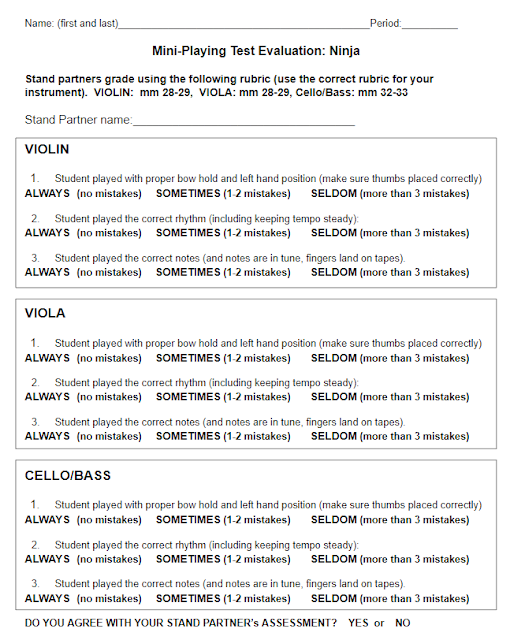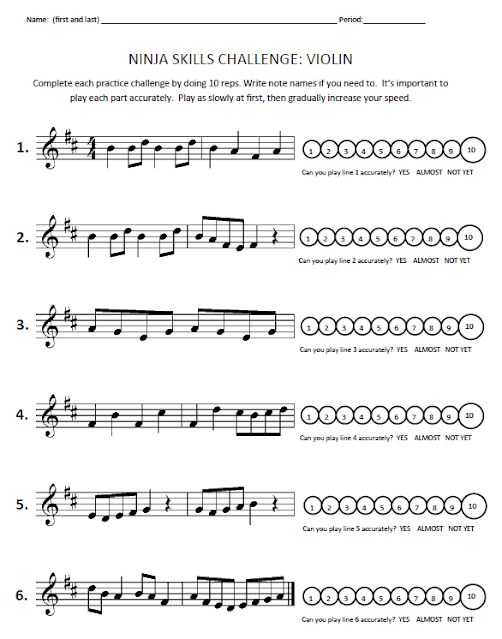What I do instead...
1. Self Assessments
I want my students to be able to self-reflect on their own playing. In order in improve, students must be aware of what/how they are playing in order to decide what to fix or change. Frequent self-assessments promotes student ownership and accountability. They know what is expected and where they stand. Self-assessments are quick and take very little class time.
Sample:
2. Peer Assessments
Instead of using an entire rehearsal for playing tests, I have students grade each other using very specific rubrics. We practice using the rubric as a class by having students grade me. Students listen to each other and circle the scores on the rubric. I love doing peer assessments because they don't take very much time. Stand partners actually talk to each other and help each other and I believe it creates a team dynamic. It helps students realize all are students need to master the skills for our group to succeed. At the end of the rubric, I ask a few questions: 1. Do you agree with your stand partner's assessment of your playing? 2. What did you do well? 3. What do you need to work on? Do you need help?
Sample:
3. Guided Practice
When I want students to master a specific challenging passage in our music, I create guided practice sheets. During class, students spend 15-20 minutes going through the practice sheet. By the end, students have drastically improved. After one guided practice assignment, one of my students said, "This is witchcraft! You should make these sheets more often. I'm so much better at playing that part now!"
Samples:

.png)
.png)




Thanks for another great post! I make a rehearsal calendar and study guide for students when we begin a new piece- is the ninja skills practice sheet something like that? Are they for the whole group or by section? Similar to your self-assessment's, my goal is that by the end of MS students can create their own study guides with peers in sections.
ReplyDeleteMy guided practice sheets aren't really a study guide...but I like the idea of mapping out practice in that way. I use guided practice during rehearsal where each student plays through the assignment while I walk around the help people. Usually takes 15-20 minutes...then we play as a class. I make different sheets for each section so they are practicing the excerpts I feel they need to work on.
DeleteWhat do you use to make your guided practice sheets? I do something similar, but I don't have time to make something like this, so my students just get a short in class practice assignment as "bellwork". It works okay, but it doesn't help kids break things down. If you ever create these sheets for specific pieces...I am in the market! Or if you've got tips for creating them quickly, I am all ears!
DeleteI use Publisher and Finale to make my guided practice sheets. I think I can make a template where you just have to add the notes...I'll share a template soon!
DeleteThat would be amazing if you could share! I love your ideas!! You rock!
DeleteHow much time do you spend making this guided sheets? It seems like a lot to input a separate line for each exercise?
DeleteIt takes anywhere from 30 mins to an hour. To me it’s totally work the time.
DeleteThis was posted at such a good time, I'm an orchestra teacher/gen music for grades 1-3 as well, and recorder karate is very motivating but the testing is beyond time consuming for 25 minute classes. Doing peer assessment would look great for my upcoming observations too!
ReplyDeleteYes - admins love group/peer evaluations.
DeleteI would love to take the traditional playing tests away. How would you see yourself doing this with high schoolers? I have students that play very much at a middle school level, but others that are advanced and playing grades 4-6 music. Would you do things any differently?
ReplyDeleteAlso, how do you deal with the students who may be uncomfortable or scared about playing for their peers?
Great questions! I teach middle school - year 1 and year 2 players. If I taught high school, I would likely still do playing tests combined with other practice assignments. I feel that would help high school prepare for solos/performing. I haven't had any middle schoolers afraid to play for their peers, yet. If that happened, I would have them record and watch themselves using a chromebook in one of my practice rooms.
DeleteIf orchestra is a class, like any other, how would you set up a grading system?
ReplyDelete